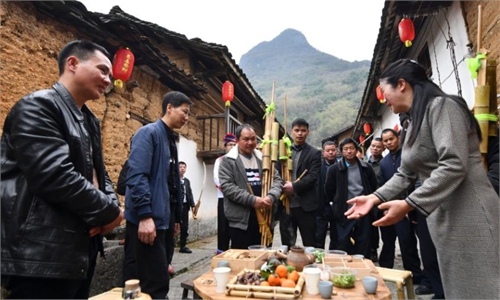China adds future robots, rural governance as undergraduate majors to better serve national development strategies

A visitor interacts with a humanoid robot at the China 5G+ Industrial Internet Conference in Wuhan, Central China's Hubei Province on November 20, 2022. China has more than 4,000 "5G+industrial internet" projects in 10 key industries including electronic equipment manufacturing, iron and steel, and electric power. Photo: cnsphoto
China has added the subjects of future robots and rural governance as new undergraduate majors, which experts said could reserve talent to boost China's artificial intelligence (AI) development and better serve the country's national strategies such as rural vitalization and common prosperity.
The Ministry of Education (MOE) has added 21 new types of subjects to the list of undergraduate majors to guide universities to open access to relevant majors that are urgently needed by national strategies and regional development, such as the future robots course under the cross-engineering category, which was set up for the first time under the engineering subject to cultivate top interdisciplinary talent.
Other new majors include rural governance, data science, biomaterials, national park construction, barrier-free management, family education and education for autistic children.
Experts highlighted the majors of future robots and rural governance and the emphasis on major adjustment on engineering subjects, as the cultivation of human resources in these areas is extremely important to boost China's social and economic development.
For example, the major of future robots will prepare talent to boost the development of AI, which has started to infiltrate more and more sectors, and students majoring in rural governance will contribute to achieving "rural vitalization" and "common prosperity," both of which seek to narrow the wealth gap and promote equality, Xie Zuoxu, a professor of higher education studies at Xiamen University, told the Global Times on Thursday.
China proposed the rural vitalization strategy in 2017, setting the goal that all Chinese people, whether in cities or rural areas, will have equal access to basic public services by 2035, and by 2050, rural areas should have robust agriculture, beautiful landscapes and prosperous farmers.
As the ministry has set, revoked or adjusted more than 2,800 undergraduate majors with engineering-related majors accounting for the largest number, Xie said this reflected the country's effort to upgrade itself from a manufacturer of quantity to one of quality, for which talent will be the key basis. The distribution of undergraduate majors has been further optimized, and the awareness and ability of universities to actively serve economic and social development have been further enhanced, according to the MOE.
China revealed a plan in 2015 to become a "world manufacturing power" by 2025, seeking to shift from a low-end manufacturer to a high-end producer of goods by enhancing innovation, its industrial base and green development.


